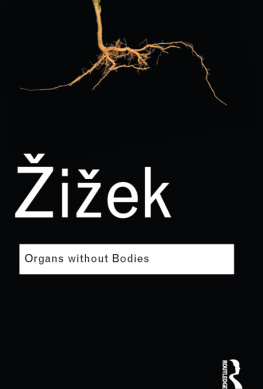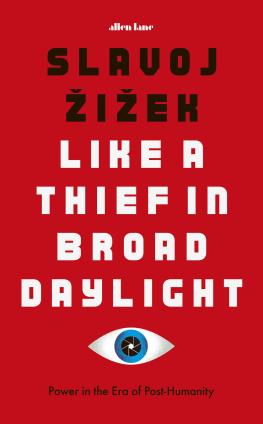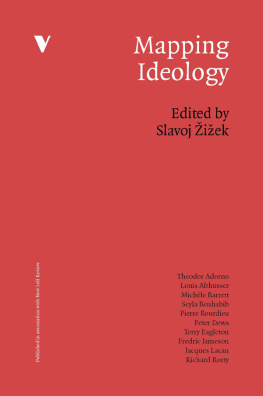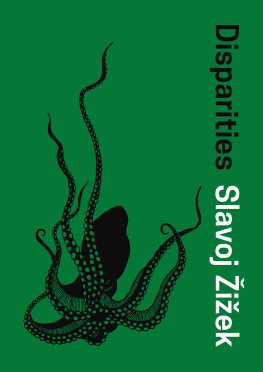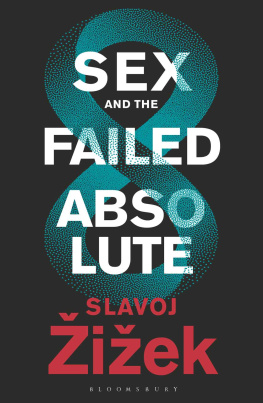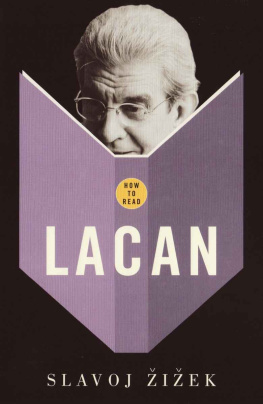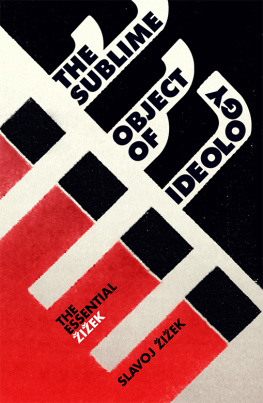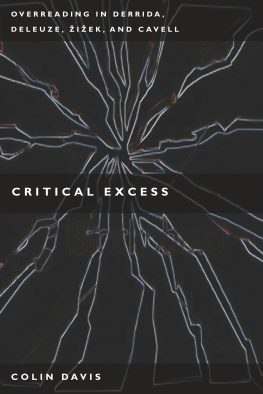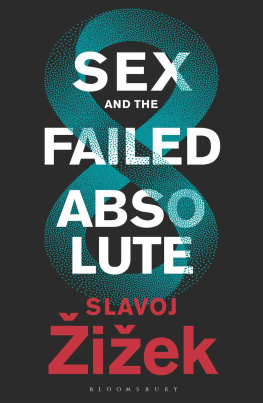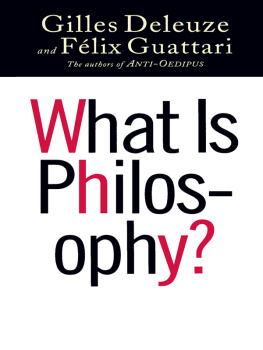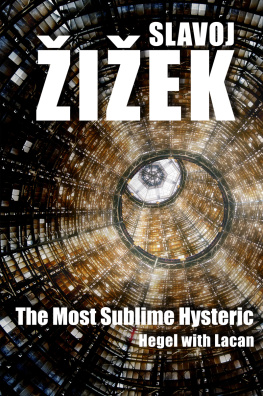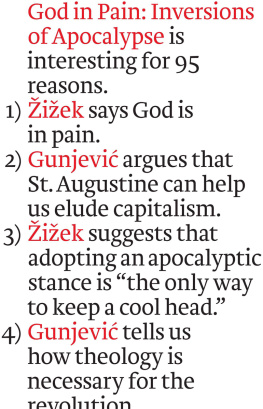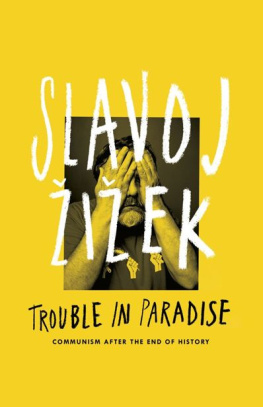Organs without Bodies
For those who thought they could by-pass Deleuze as well as for the most passionate Deleuzians, Organs Without Bodies will be a major revelation. By placing Deleuze into proximity with his great antipodesHegel and Lacaniek endows Deleuzes tireless elaboration of the processes of differentiation and becoming in all spheres of life with an entirely new degree of conceptual clarity and political urgency. Through his deep engagement with the logic of Deleuzes project, iek opens up new possibilities of thought beyond the terms of the current political debates on globalization, democratization, war on terror. Once again, iek has produced an utterly timely and radically untimely meditation.
Eric Santner, author of On the Psychotheology of Everday
Life: Reflections on Freud and Rosenzweig
With all his usual humor and invention, iekthe acknowledged master of the 180 degree turnhere takes a trip into enemy territory to deliver Deleuze of a marvelously rebellious child, one that seriously challenges Deleuzes other progeny with a surprising but convincing bid for succession. Those who thought Deleuzes forward march into the future would follow a straight path are forced to rethink their stance. From now on all readings of Deleuze will have to take a detour through this importanteven necessarybook.
Joan Copjec, author of Imagine Theres No Woman
As a writer, Slavoj iek can translate difficult philosophical positions in a succinct way while maintaining its original force and insight. And so, Organs without Bodies is a provocative and important book for Deleuzians because it successfully opens a reading of Deleuze that is anti-conventional and moves against the current. What all this points to is how iek is an unconventional thinker with radical and originary insight. This makes Organs without Bodies a worthwhile and necessary read.
Robert Ramos, Metapsychology Online
Routledge Classics contains the very best of Routledge publishing over the past century or so, books that have, by popular consent, become established as Classics in their field. Drawing on a fantastic heritage of innovative writing published by Routledge and its associated imprints, this form some of the most important works of modern times.
For a Complete list of titles visit
www.routledge.com/classics
Slavoj
iek
Organs without Bodies
On Deleuze and Consequences
With a new introduction by the author

First published in 2004 by Routledge
First published in the Routledge Classics 2012
by Routledge
2 Park Square, Milton Park, Abingdon, Oxon OX14 4RN
Simultaneously published in the USA and Canada
by Routledge
711 Third Avenue, New York, NY 10017
Routledge is an imprint of the Taylor & Francis Group, an informa business
Introduction 2012 Slavoj iek
2004, 2012 Routledge
The right of Slavoj iek to be identified as author of this work has been asserted by him in accordance with sections 77 and 78 of the Copyright, Designs and Patents Act 1988.
All rights reserved. No part of this book may be reprinted or reproduced or utilised in any form or by any electronic, mechanical, or other means, now known or hereafter invented, including photocopying and recording, or in any information storage or retrieval system, without permission in writing from the publishers.
Trademark notice : Product or corporate names may be trademarks or registered trademarks, and are used only for identification and explanation without intent to infringe.
British Library Cataloguing in Publication Data
A catalogue record for this book is available from the British Library
Library of Congress Cataloging in Publication Data
iek, Slavoj.
Organs without bodies : on Deleuze and consequences / Slavoj iek.
p. cm.(Routledge classics)
Includes bibliographical references and index.
1. Deleuze, Gilles, 1925-1995. I. Title.
B2430.D454Z59 2012
194dc23
2012001605
ISBN: 978-0-415-51904-5 (pbk)
Typeset in Joanna
by RefineCatch Limited, Bungay, Suffolk
I NTRODUCTION TO THE R OUTLEDGE C LASSICS E DITION
I HEGEL, LACAN, DELEUZE
The most succinct definition of Deleuzes late philosophy would have been that it is a Fichteanized Spinozismand we should just bear in mind that Fichte was (or perceived himself as) the absolute anti-Spinozist. The purely virtual self-referential creating moves at infinite speed, since it needs no externality in/through which to mediate its self-positing movement:
Infinite speed thus describes a movement that no longer has anything to do with actual movement, a purely virtual movement that has always reached its destination, whose moving is itself its own destination.
This is why Deleuze insists that desire has no object (whose lack would trigger and sustain its movement): desire is a purely virtual movement that has always reached its destination, whose moving is itself its own destination. This is the thrust of Deleuzes reading of masochism and courtly lovein both cases, not logic of sacrifice, but how to sustain the desire According to the standard reading of masochism, the masochist, like everyone, also looks for pleasure; his problem is that, because of the internalized superego, he has to pay for his access to pleasure with the pain, to pacify the oppressive agency which finds pleasure intolerable. For Deleuze, on the contrary, the masochist chooses pain in order to
dissolve the pseudo-link of desire with pleasure as its extrinsic measure. Pleasure is in no way something that can only be reached via the detour of pain, but that which has to be delayed to the maximum since it is something
And the same goes for courtly love: its eternal postponement of fulfilment does not obey a law of lack or an ideal of transcendence: here also, it signals a desire which lacks nothing, since it finds its fulfilment in itself, in its own immanence; every pleasure is, on the contrary, already a re-territorialization of the free flux of desire.
The obverse of this misreading of Hegel is Deleuzes second reproach: whereas according to Hegel any given thing differs with itself because it differs first with all that it is not, i.e. with all the objects to which it relates, Deleuzes Bergson affirms that a thing differs with itself first, immediately, on account of the internal explosive force it carries within itself. If ever there was a straw-man, it is Deleuzes Hegel: is not Hegels basic insight precisely that every external opposition is grounded in the things immanent self-opposition, i.e., that every external difference implies self-difference? A finite being differs from other (finite) things because it is already not identical with itself.
When Deleuze talks about a process which creates and sees in a single movement, he thereby consciously evokes the formula of intellectual intuition, the prerogative of God alone. Deleuze pursues a pre-critical agenda, passionately defending Spinozas and Leibnizs metaphysical realism (direct insight into the very core of things in themselves) against Kants critical limitation of our knowledge to the domain of phenomenal representations. However, the Hegelian reply to this would have been: what if the distance of re-presentation, the distance that renders the thing inaccessible to us, is inscribed into the very heart of the thing itself, so that the very gap that separates us from the thing includes us into ittherein resides the core of the Hegelian Christology, in which our alienation from God coincides with the alienation of God from himself. Deleuze says that propositions do not describe things but are the verbal actualization of those things, i.e. these

